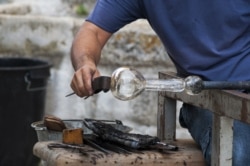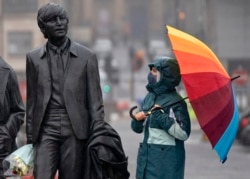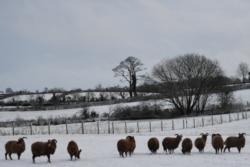And now, Words and Their Stories from VOA Learning English.
On this program, we explore words and expressions in the English language. And we often explain where they come from and how to use them.
In the summer months, we often get together with our family members who live far away. If you listen in as people talk with and about their families, you might hear some interesting expressions.
Like many idioms, it is often difficult to understand these expressions simply by knowing the meaning of individual words and the grammar of the sentence in which they appear. This week we will explore a few of these expressions, so you will understand them better when you hear them.
While watching television with your family in a crowded room, you might hear, "Your father was not a glass blower."
Of course, it is impossible for a person to be made of glass. That expression really means you are blocking the view of someone else, and they want you to move.
A similar expression is, "You make a better door than a window." It also means, "Please move out of the way."
When a child starts to act just like the parent, we say, "He's a chip off the old block." This suggests the image of an artist making a statue of someone from a block of stone. It can mean that the child is made of the same material as the parent. In a similar way, we may think that a child's action can show how they will act as an adult. To express this idea, we use the phrase, "The child is father to the man."
Lighting a fire for a family barbecue is a job that can be easy, with the right tools. After she lit the barbecue grill, I heard my sister say, "… and Bob's your uncle, there's the fire." This expression means something is easy. It describes how those in high positions may sometimes give jobs to family members, making their lives easier.
There are other expressions that have to do with money in the family. Someone who starts out life in a wealthy family was "born with a silver spoon in their mouth." And an adult may warn a child, "A fool and his money are soon parted." In other words, do not make a bad investment or spend money unwisely. And a child who is not given an inheritance is said to be "cut off without a penny."
My younger brother liked to play with the boys on our street who always caused trouble. Mom told him to stay away from the troublemakers with this expression: "Birds of a feather flock together." She meant that, if he does not want people to think he is one of the troublemakers, he should not spend time with them.
That is good advice. The child who does not listen to mother's words is in danger of becoming the "black sheep of the family." That expression describes a family member whose behavior gives them a bad reputation.
Speaking of animals, our cat is going to have kittens soon. A friend who saw her said she was "in a family way." Soon, the cat will have her own family to care for.
Finally, when a group of people live or work closely together, they might say, "We are like one big happy family – we argue all the time!" This expression could mean that the group is happy to be so close; or, if said with irony, it means the group is not happy to work together.
And that’s all the time we have for this Words and Their Stories.
I’m Jill Robbins.
Dr. Jill Robbins wrote this lesson for Learning English. Mario Ritter, Jr. was the editor.
__________________________________________________________________________
Words in This Story
view –n. the things that can be seen for a particular place
statue – n. a figure usually of a person or animal that is made from stone, metal, or wood
grill –n. a device used to cook over an open fire or hot coals
inheritance – n. money, property, or the like that is received from someone when that person dies
reputation –n. the common opinion that people have about someone; the way people think about someone
irony – n. the use of words that mean the opposite of what you really think especially to be funny
What expressions do you have in your language about family members? We want to hear from you. Write to us in the Comments Section.








